Intro
Understand Alcohol Detox Symptoms, including withdrawal, tremors, and anxiety, and learn about the recovery process, treatment options, and managing severe detox side effects.
Alcohol detoxification is a process that helps individuals overcome their physical dependence on alcohol. When someone who is accustomed to drinking heavily decides to stop or significantly reduce their alcohol intake, their body may react with a range of symptoms. These symptoms can be uncomfortable, painful, and even life-threatening in severe cases. Understanding the importance of addressing alcohol detox symptoms is crucial for individuals seeking to overcome their addiction and live a healthier lifestyle.
The process of alcohol detoxification is complex and involves various physiological and psychological changes. As the body adapts to the absence of alcohol, it may experience a series of withdrawal symptoms. These symptoms can vary in severity and duration, depending on factors such as the amount and frequency of alcohol consumption, the individual's overall health, and their genetic predisposition. It is essential to recognize the signs and symptoms of alcohol detox to provide proper support and care for individuals undergoing this process.
Alcohol detox symptoms can be mild, moderate, or severe, and they can manifest in different ways. Some common symptoms include nausea, vomiting, headaches, fatigue, and irritability. In more severe cases, individuals may experience seizures, hallucinations, and delirium tremens, a condition characterized by confusion, agitation, and tremors. The severity and duration of these symptoms can be influenced by various factors, including the individual's drinking history, their age, and any underlying medical conditions. Recognizing the signs and symptoms of alcohol detox is critical for providing effective support and care for individuals undergoing this process.
Understanding Alcohol Detoxification
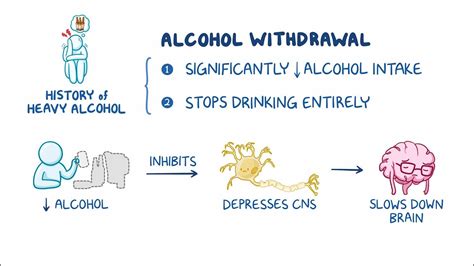
Phases of Alcohol Detoxification
The process of alcohol detoxification can be divided into several phases, each with distinct characteristics and challenges. The first phase, which typically lasts for 24-48 hours, is characterized by the onset of withdrawal symptoms such as nausea, vomiting, and headaches. The second phase, which can last for several days or weeks, is marked by the presence of more severe symptoms such as seizures, hallucinations, and delirium tremens. The final phase, which can last for several months or even years, is focused on maintaining sobriety and preventing relapse. Understanding the different phases of alcohol detoxification is crucial for providing effective support and care for individuals undergoing this process.Alcohol Detox Symptoms
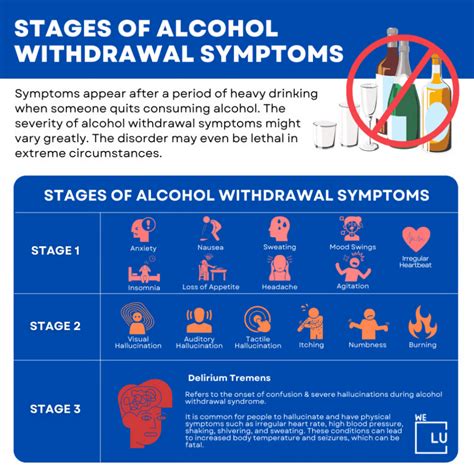
Managing Alcohol Detox Symptoms
Managing alcohol detox symptoms requires a comprehensive approach that addresses the physical, emotional, and psychological aspects of withdrawal. Medications such as benzodiazepines and anti-seizure medications can be used to manage symptoms such as seizures and hallucinations. Counseling and support groups can provide emotional support and guidance throughout the detoxification process. A healthy diet, regular exercise, and adequate sleep can also help alleviate symptoms and support the recovery process. Understanding the different strategies for managing alcohol detox symptoms is crucial for providing effective support and care for individuals undergoing this process.Benefits of Alcohol Detoxification
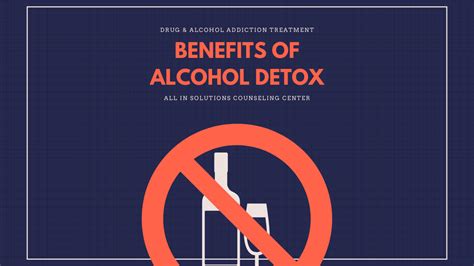
Challenges of Alcohol Detoxification
Alcohol detoxification can be a challenging and complex process, both physically and emotionally. Some of the challenges include: * Withdrawal symptoms: The symptoms of withdrawal can be uncomfortable, painful, and even life-threatening in severe cases. * Cravings: Individuals may experience intense cravings for alcohol, making it difficult to stay sober. * Emotional challenges: Detoxification can be an emotional rollercoaster, with individuals experiencing feelings of anxiety, depression, and irritability. * Social challenges: Individuals may face social challenges, such as stigma and discrimination, which can make it difficult to seek help and support. * Relapse: The risk of relapse is high, especially during the early stages of recovery.Alcohol Detoxification Treatment Options
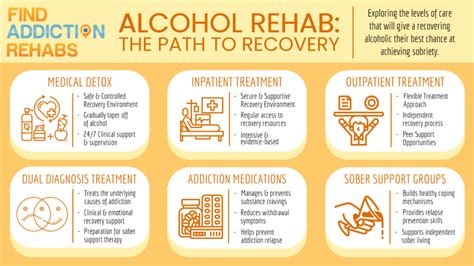
Choosing the Right Treatment Option
Choosing the right treatment option depends on several factors, including the individual's addiction severity, overall health, and personal preferences. It is essential to consult with a healthcare professional to determine the best course of treatment. Some questions to consider when choosing a treatment option include: * What are the individual's treatment goals? * What is the individual's addiction severity? * What are the individual's overall health and medical needs? * What are the individual's personal preferences and values?Support and Resources for Alcohol Detoxification
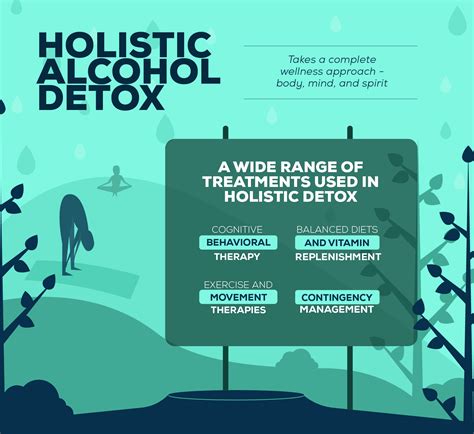
Importance of Support and Resources
Support and resources are essential for individuals undergoing alcohol detoxification. They can provide individuals with a sense of community and support, helping them stay motivated and engaged in the recovery process. Some of the benefits of support and resources include: * Improved treatment outcomes: Support and resources can improve treatment outcomes by providing individuals with the tools and guidance they need to stay sober. * Increased sense of community: Support and resources can provide individuals with a sense of community, reducing feelings of isolation and loneliness. * Improved mental health: Support and resources can improve mental health by providing individuals with a safe and supportive environment to discuss their feelings and develop coping skills.What are the symptoms of alcohol detoxification?
+The symptoms of alcohol detoxification can include nausea, vomiting, headaches, fatigue, irritability, and seizures. In severe cases, individuals may experience delirium tremens, a condition characterized by confusion, agitation, and tremors.
How long does alcohol detoxification take?
+The length of time it takes to complete alcohol detoxification can vary depending on factors such as the individual's addiction severity and overall health. In general, the process can take anywhere from a few days to several weeks or even months.
What are the benefits of alcohol detoxification?
+The benefits of alcohol detoxification include improved physical and mental health, increased energy and motivation, and a reduced risk of health problems such as liver disease and heart disease.
In conclusion, alcohol detoxification is a complex and challenging process that requires a comprehensive approach to address the physical, emotional, and psychological aspects of withdrawal. By understanding the symptoms, benefits, and treatment options available, individuals can make informed decisions about their care and support. If you or someone you know is struggling with addiction, it is essential to seek help and support from a healthcare professional or a reputable treatment center. Remember, recovery is possible, and there are many resources available to support you throughout the journey. We encourage you to share your thoughts and experiences with us, and to reach out to a healthcare professional or a support group for guidance and support.
